#Law Lok Lam
Text
雖然已經正式又係一個新年嘞…精神上係噉想諗但實際上,同舊年並冇咩分別…只不過係月曆牌換咗啫!(笑) 日常生活都係要照過嘅!
而呢個周末假期同平時嘅周末假期冇咩分別,如果冇人叫我出去嘅話,我都係選擇留喺屋企靜靜地讀下書,睇下電視節目噉。我嘅生活方式係咪聽起嚟好無聊呢?(笑) 笑我都無所謂啦!都習慣囉!
講返正題…所以今次同平時嘅閒時一樣,我選擇留喺屋企睇舊港劇。既然 「無線」 先排又喺網上重播 《非常保鑣》,我就睇返一下。雖然好似唔係幾耐前我先睇過一次喔!(笑) 無所謂啦!因為我好鍾意睇陳妙瑛啲劇,亦都比較鍾意睇啲舊港劇嘛!
而呢齣劇雖然同一般 「無線」 嘅細製作品小型製作品冇咩特別,但起碼總算係有啲好笑,其他演員中亦都冇一個會令我討厭到,覺得煩嗰啲,所以對我嚟講係算一齣 「好劇」。(笑)
今次睇返,起碼可以仔細聽多啲上一排前排冇留意到嘅一些說話,可以再次學多一啲只有廣東話獨有嘅短語。喺呢個新嘅一年,繼續進步廣東話改善我嘅廣東話(同中文)吧!🉐
改寫:多得 mslinchinese @ Instagram 嘅指點!多謝晒!m(_ _)m

「佢哋話呢要籌募經費建新禮堂。」
新詞:籌募 (cau4 mou6 / chóu mù)
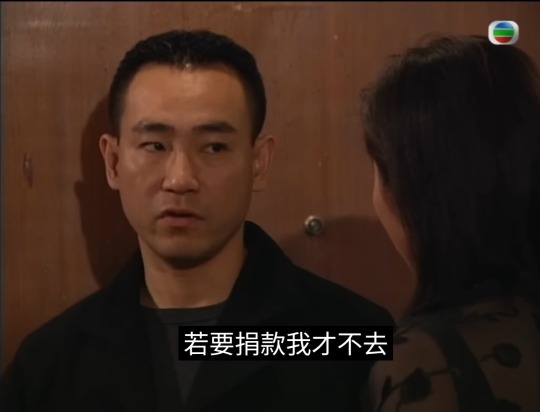
「嘩要捐款嘅唔好預埋我呀!」
新詞:預埋 (jyu6 maai4)
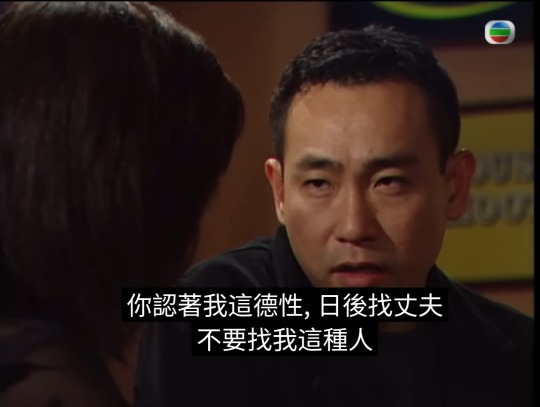
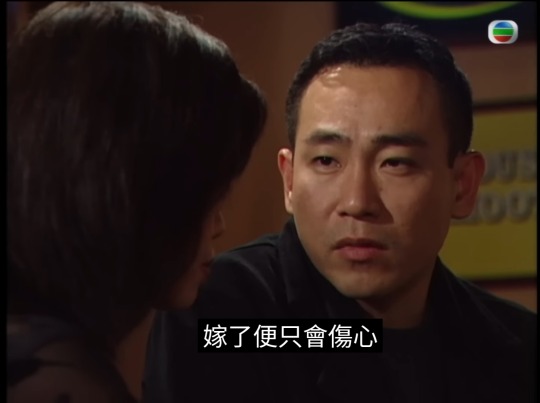
「認住我呢個嘜頭,第日搵老公唔好搵我呢態人,嫁咗賺心悒。」
新詞:嘜頭 (mak1 tau4),心悒 (sam1 ngap1/jap1)

「咪咁篩自己嘞。」 / 「別這麼奚落自己。」
新詞:篩 (sai1),奚落 (hai4 lok6 / xī luò)
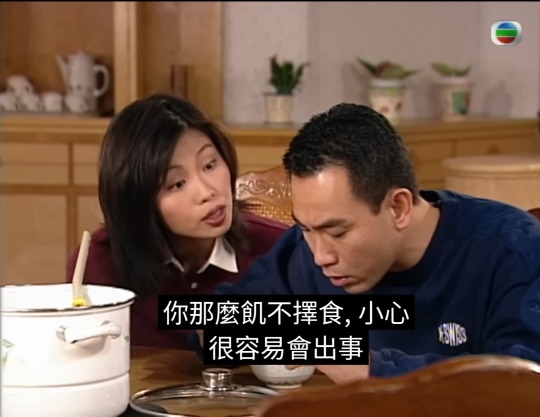
「你咁飢不擇食呀,因住添呀!好容易出事…」
新詞:飢不擇食 (gei1 bat1 zaak6 sek6/zī bù zé shí)
第二集
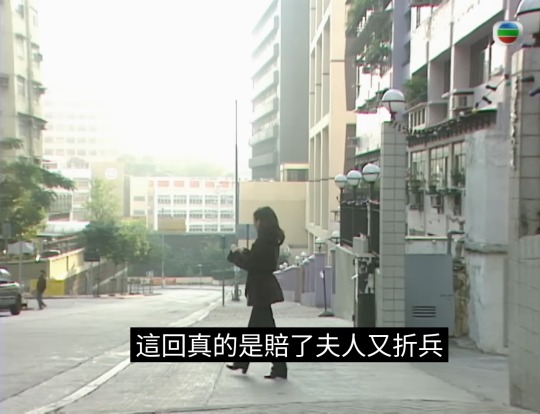
「今次真係偷雞唔到蝕揸米。」 / 「這回真的是賠了夫人又折兵。」
新詞:偷雞唔到蝕揸米 (tau1 gai1 m4 dou2 sit6 zaa1 mai5),賠了夫人又折兵 (pui4 liu5 fu1 jan4 jau6 zit3 bing1 / péi le fūren yòu zhé bīng)
第四集
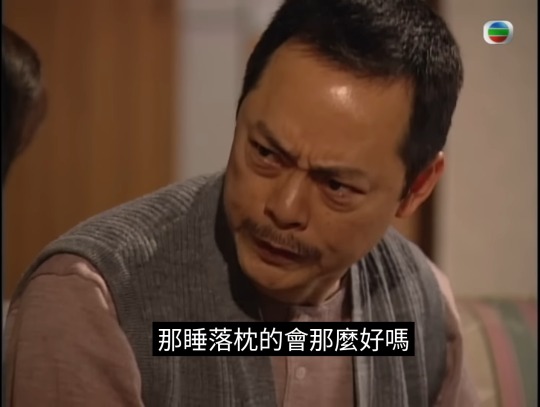
「嗰個瞓厲頸會咁好死?!」
新詞:瞓厲頸 (fan3 lai2 geng2)
第五集
《非常保鑣》 (1999)
#Canto I learn?#Dake Rambles#Canto Practise#Cantonese#Mandarin#Mandoring along#Chinese Language#Language#HK Drama#Ultra Protection#TVB#Mariane Chan#Bowie Lam#Angie Cheong#Law Lok Lam#My Caps
7 notes
·
View notes
Link
Further reading:
HKFP: Stand News sedition trial: Hong Kong should tolerate criticism, even if it is not constructive, ex-editor says, February 17, 2023
#Bao Choy#The Collective HK#media#hong kong free press#journalism#Ken Lui Tsz Lok#journalistic freedom#Reporters Without Borders#hong kong national security law#Stand News#Chung Pui Kuen#Owen Chow#editorial independence#censorship#Benny Tai#Patrick Lam#news
8 notes
·
View notes
Text
Meet the Lungs: TVB’s Very Own Roy Family
I’m not sure how many people watch both Succession and Come Home Love: Lo and Behold, but I wanted to write about the similarities between the Roy family and the Lung family on the respective shows. In fact, I’ve made 4 parody trailers featuring clips from Lo and Behold paired with the audio from Succession trailers, and they fit pretty damn well. (See below)
https://www.youtube.com/watch?v=aVCL2G43zbk
https://www.youtube.com/watch?v=SDacsg3rnGA
https://www.youtube.com/watch?v=_brbg6kLDu4&ab_channel=lotuspond
https://www.youtube.com/watch?v=eMFx2EFAccI&ab_channel=lotuspond
At first glance, it is pretty easy to spot the striking similarities between the two families. The Roys have Waystar Royco, the fictional American media conglomerate powerhouse, while the Lungs have Zip Lung, a company that started out as the Wai Lung Department Store, and now has ventures in practically every industry. Both companies are spearheaded by the paternal figure, Logan Roy (Brian Cox) and Lung Kam Wai (Law Lok Lam) respectively. Even their family names are meant to reflect power — Roy, deriving from “Roi” meaning “King”, and Lung, meaning Dragon, the symbol of imperial power in Chinese culture.
While the Roy children and the Lung children aren’t exact equivalents of each other in terms of birth order, the core three (if you don’t count the Connor Roy (Alan Ruck), who has a different mother than the other Roy kids)— Kendall (Jeremy Strong), Roman (Kieran Culkin), and Siobhan aka “Shiv” (Sarah Snook) can be compared to Max (Hoffman Cheng), King Fung aka “Fung Siu” (Andrew Chan), and Linda (Mandy Lam). There is also the difference wherein the Lung siblings have different mothers, and therefore come from competing “Chambers”, but the comparison still stands nonetheless. They also have similar characteristics as the narcissistic and power-hungry son who desperately wants to inherit his father’s position at the company, but in reality, lacks the skill underneath. Roman may not actually be the youngest sibling, but he exudes the energy of the youngest child. He is the comedic relief with a lack of interest in taking over the company compared to the other siblings, and is actually suffering beneath the jokes and happy go lucky attitude, just like Fung Siu. Lastly, although Shiv isn’t the eldest daughter like Linda, being a woman with great leadership qualities yet the only daughter in the men’s business makes them both targets of misogyny. Both fathers also have a history of treating their wives (plural) and women in their lives poorly. Though Linda has a younger sister Vivian (Katherine Ho), she’s both written out of the show and was never interested in the family business. All three children in both shows crave their father’s approval and validation more than anything, due to the lack of love received from him growing up. In both cases, their father loved the company more than they loved them, which is why they want to become CEO so badly.
(Side note: I’ve written about Linda and her father’s relationship previously https://medium.com/@doneforme/daddy-issues-face-and-filial-piety-in-come-home-love-lo-and-behold-42014bbaeaf ).
Shiv and Logan’s relationship reminds me of Linda and her dad, though perhaps there is more genuine love between the latter due to the nature of the sitcom. Still, every time I watch a scene in Succession where Shiv feels powerless as she seeks attention from her dad, or gets ignored or belittled as the only woman in the room, I can’t help but be reminded of Linda. Both Shiv and Linda have to fight their way to the top, to prove that they are just as, if not more capable than their brothers. Linda and her husband Sung Shui Fai (Jack Hui) aren’t exactly the “fail marriage” trope like Shiv and Tom Wambsgans (Matthew Macfayden), but there are still some similarities especially early on in the relationship. Tom and Fai both come from lower status backgrounds, and marry into a powerful and rich family, where their wives have more success than them (at least in the beginning for Tom). Both men are frequently seen as accessories of their wives rather than their own person. Fai dips into his darker side briefly, but ultimately Fai and Linda’s genuine love is far less toxic than what Tom and Shiv have going on. Fai would do anything for approval from Linda’s father, but his goal is to be accepted into the family so he can marry Linda, not so he can gain the position of CEO. On the other hand, Shiv had a career in politics and initially didn’t want to get into the family business, whereas Linda was vying for a leading position at Zip Lung since birth. In the final season, Shiv also feels trapped in her unexpected role as a mother, something that she did not ask for. There, Shiv being reduced to a daughter, a wife, and now a mother, is the show’s way of showcasing the misogyny against her. The lighthearted sitcom is different, portraying Linda as a caring and willing stepmother to Fai’s young son Philip (Dylan Leung).
Succession asks the question of whether the cycle of generational trauma and toxicity can be broken. Even after Logan’s death, the siblings are still haunted by his looming presence, afraid that he’s still upset with them for every move they make. They’re so afraid of becoming their father, whether as a leader or as a parent. In the end of Succession, Tom becomes CEO of Waystar, and Shiv is merely the one next to him. Linda always assumes that her chances of being successor to Zip Lung are slim due to her gender, because her father has always favoured sons over daughters. While Lo and Behold hasn’t reached that point in the storyline (yet), there’s no telling what may happen to the future of Zip Lung. Fai may be the Head of the Restaurants department, but I could not see him leading Zip Lung. Of course, there is no telling what will happen and I guess we will have to wait and see…
1 note
·
View note
Photo










Thinking about family. Sis Kiu tells Potsai that his older brother didn’t die, but was taken away by a palace eunuch. They just let him think that his older brother died to save him the heartache of losing his only family. Potsai now hopes to locate and reunite with his big brother.
#captain of destiny#hung tony#chan grace#pirates#time travel#law lok lam#shiu maggie#reunited family#洪永城
3 notes
·
View notes
Photo

“No matter how much this world progresses, it’s all false. Men outside, women inside -- it can’t be changed.”
look how mad she looks XD
6 notes
·
View notes
Text
Ending & Thoughts: The Witness
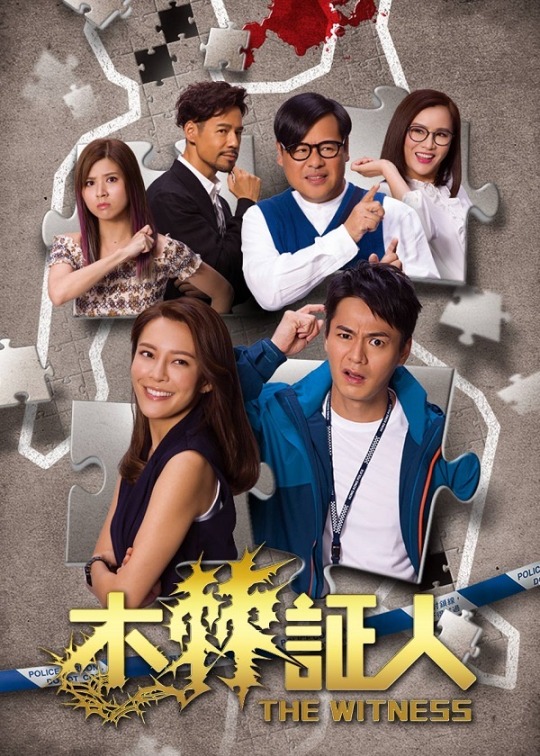
I was pretty excited for this drama. And you might think I’m crazy since a lot of people thought airing this drama is a waste of a slot. And I get it they could’ve aired bigger dramas. Chances are TVB only aired it so Him Law could get a Best Actor Nomination which they need to fill out the quota for it. Or else it’s gonna end up being saturated with supporting actors from Come Home Love again like last year. But the premise of it is interesting! Instead of a Prince Charming protecting the gorgeous female witness (like all witness protection type dramas). We get a down on the luck rookie cop protecting a straight forward OCD guy. It’s a cute twist to it and the start of bromance.
Plot
Ah Kei (Him Law) saves Ah Fan (Willie Wai) after he witnesses a murder. Ah Fan is placed in witness protection program but because of his strange personality that makes it hard to trust others he wouldn’t allow anyone but Ah Kei who saved his life to protect him. Ah Kei ends up living with Ah Fan to protect him. That’s how he gets entangled with Chris (Kelly Cheung) and end up falling in love. Ah Kei’s older sister Miss Ko (Pinky Cheung) gets involved by falling for Ah Fan. The main case of this drama is finding Ah Fans missing memories from years ago which is also connected with Ah Kei’s fathers death.
The drama is fun to watch. The acting was great from everyone. Kelly is still a bit stiff and has a slight accent but she was still super enjoyable to watch. But the storyline started to falter a bit. It got plagued with annoying side characters and the main leads themselves are dumbed down when the story started focusing more on the mystery behind the fathers death.
- Annoying character #1 belongs to Kam Chi Sing (King Lam). I know every drama there has to be a rival. But boy, he’s just so annoying. All he cared about was getting a promotion. And always arguing with Ah Kei cause he’s such a proud guy that he’s always undermining him. Always getting in the way for Ah Kei to solve cases and he would bring up Ah Kei’s dead father just to rile him up. I’m so glad that even his followers under him stopped listening to him. That was such a good moment for him to realize everyone is tired of his shit and moved on from him. He was despicable from beginning to end. There was no redemption from him. His smirk is downright cocky.
- Annoying character #2 goes to Ah Kei’s ex-girlfriend Yuki (Sammi Cheung). She’s always spending her time shopping which is how she always racks up her credit card debt. In which she decides to borrow money to pay it off. It causes loan sharks to chase after her & always needing Ah Kei’s help to solve it. Her character is infuriating. She lives with Ah Kei rent free, eats for free & has been with him for 10 years. Yet she goes and cheats on him. And when she gets caught she makes up a lie to get him to believe her. In the end when Ah Kei finds out the truth she blames him. WTH. She blames him for not caring about her enough & how she doesn’t defend her when her sister calls her out on things. Nevermind the fact that he’s always running around scraping for money to pay off your debt. Nevermind how he’s always treated you well despite your spending habits. It’s HIS FAULT that she ended up cheating. It’s disturbing that while she’s cheating she’s finding all these ways to hide it while still living with him. And when she witnessed something that could save Ah Fan from wrongly getting arrested she chooses to ignore it so she can continue her affair. Ugh. I hate cheaters especially ones that feign innocent and blames the other partner. Like own up to your wrong doings.
- Annoying character #3 is given to Yip Cheung Lok (Lau Kong). He’s always flip flopping on his emotions. Years ago he finds out his son Gordon (Tsui Wing) was involved with a kidnapping- murder case. He decides to protect him by sending him to America. And years later when he finds out his son has done more horrible things like committing more murders. At first he’s like “I’m gonna call the cops, you’re going to jail” and then the next minute he shuts his mouth to protect his son. He’s always apologizing and trying to “fix” things which just made things worse. Instead of leaving Chun Po (Helen Ma) alone he instead tricks her to live with them. This is the reason why she died cause she kept spouting details about what happened in the past to Gordon. When he realized all the wrong doings of his son. He does nothing to stop it. I get it he’s sick in bed. But he was able to leave and walk. His son isn’t watching him 24/7. He could have easily picked up the phone and call Ah Fan to warn him about Gordon. He didn’t even have to call the cops to get Gordon arrested. The bare minimum for him to do would be at least try to stop Gordon from taking over Ah Fans fathers company. But he did nothing. In the end he died because his own son attacked him & basically left him to die. Sad but fitting end for him considering he’s the one that let his son spiral this out of control. Gordon committing the first crime could be a mistake, but committing a second and third? That’s no longer a mistake but a choice.
The Love Triangle
Pretty annoying. Chris and Ah Kei has cute chemistry. And I really like how it developed they saw each other in a different light. I was disappointed that they dragged out the triangle though. Ah Kei bothered me with how he handled Yuki. I understand that you dated Yuki for 10 years so it’s hard for him to just abandon her. But really? Letting Yuki live with you while dating Chris? Anyone would be pissed. Chris has the right to get mad. Yuki & Ah Kei didn’t have a amicable breakup she cheated and threw a fit about how she’s right and he’s wrong. The next time they saw each other she slaps Ah Kei believing he assaulted her new boyfriend. Yuki girl. You dated Ah Kei for 10 years and you’d rather believe your new boy toy then the guy that stood by you all these years? This is an example of why Ah Kei doesn’t need to go that far to help Yuki. Ah Kei is so oblivious to how Yuki is trying to break apart his relationship with Chris. She sabotaged almost all their dates. I thought Yuki would redeem herself wholly once she realized how much Ah Kei loved Chris but instead she runs to find a Chris & demands her to leave him and stop stringing him along. Then they try to redeem Yuki by having her do the bare minimum to help Chris find Ah Kei. In the end they become good friends which I find unnecessary. I rather have it end with them bumping into each other & wishing each other well. Yuki has made one too many mistakes to earn the right to stay in their lives.
The Randomness
Apart from the annoying characters & love triangle. The character development of Ah Fan went downhill. Ah Fan goes through three amnesiac phases. And the first two involved him forgetting what happened during specific time periods. The third one, he forgets his sister and his friends including Ah Kei & Miss Ko. Now at first it was endearing of him trying to re-learn his past but then it turns awful when he gets used by Gordon. Which I don’t understand. Miss Ko lies to him about her being his fiancé & his sister went along with it. This gets him mad that they lied to him & he goes to live with Gordon. He wouldn’t even listen to their explanations. When Chris tells him that he never dated Gordon he refused to believe her & thought she was playing Gordon with Ah Kei. It was very hard to watch from here on. Seeing him turned into someone different. By that I meant he was no longer the smart thinker he once was. No matter what happens Chris is your sister. Your only blood relative left & yet he chooses to believe Gordon? Ignoring the fact he no longer cares or trusts Chris. He should at least sympathize the fact that this company that he chose to sign over to Gordon was the last of his fathers hardwork. Even if Ah Fan doesn’t want to be involved with the company, he could’ve passed it on to Chris his blood sister. And I’m just so confused and find it random. Before he lost his memories he doted and loved his sister, always wanting to protect her. He even moved out of their house to live with Ah Kei to protect his sister from getting hurt. They had a tight bond. Even if he loses his memories wouldn’t the familiar feeling stay? The way he tells Chris that he chooses to trust & picks Gordon over her was so heartbreaking. I refuse to believe Ah Fan would ever do that memory loss or not. Also Ah Fan is incredibly smart. He’s able to recognize smells, footsteps and even sound of voices. He’s also able to tell if someone is lying at times. You want me to believe all this time he stayed with Gordon he didn’t find anything suspicious with Gordon & his father? He lost his memory, not his brain. Gordon literally hasn’t even done anything ground breaking for Ah Fan to trust him so deeply. I was also convinced that Ah Fan was faking amnesia to get close to Gordon to build a case on him. But turns out he was just dumb & easily fooled. Even at the very end it caused him getting his memory back for him to finally realize Gordon is evil. Ah Fan went way out of character after the amnesia.
Final Thoughts
I don’t know how I feel about whether or not I’d re-watch. The beginning and middle was fun and hilarious. I think it would be better if you watch it solely for the comedic side that involved friendship, sibling bond & relationships. If you want to watch it for the crime aspect you’d be disappointed. As for this drama they dumbed down the heroes to drag on the cases to fit the 20 episode quota. They could’ve written more cases instead of dragging the three cases but I guess the writer got lazy. The writer chose to prolong it instead of writing a fresh case. The final case involving the mystery of the parents death was dragged on way too long. Ah Kei didn’t even realize Gordon killed them until the very end. He just believed Gordon is involved but not the mastermind. Also I’m shocked that Gordon would end up being such a hardcore villian. In the beginning he was just another spoiled rich boy. I always thought he made mistakes because he was pampered & wanted more money. The fact Gordon killed years ago and went on to kill more people & even offed his own father was something I didn’t expect happening. Especially since this is supposed to be considered a light comedic cop drama, I never thought it would go as far as family killing. I also hoped that there would be more bromance between Ah Kei & Ah Fan. I was sorely disappointed that their interactions afterwards just involved him pressuring Ah Fan to regain his memory instead of an actual friend bonding LOL. All in all it was a good watch. Willie Wai gave an impressive & eye catching portrayal. Honestly if we’re talking about TV King, Willie should win. He has always been a solid actor & his performance was great and he recieved a lot of praises. He didn’t come off as annoying with his OCD & strange personality. Despite his character going off the walls in the later episodes he still acted very well. Unfortunately the drama got sub par ratings so him winning is very unlikely. Also along with the fact TVB has no plans on promoting him. (He only got this role cause TVB literally ran out of older actors). But my vote goes to Willie to win nonetheless. I guess I’d probably re-watch the beginning again and just skip the unnecessary amnesia arc.
0 notes
Text
JAMES HUNTER: ONE COUNTRY, TWO SYSTEMS, FIVE DEMANDS

One country, two systems, five demands
In scenes reminiscent of Tiananmen square, students and fellow citizens resisted the oppressive force that is the Hong Kong Police Force (HKPF). Once acclaimed to be “Asia’s Finest”, they serve the wishes of their People's Liberation Army (PLA) overlords. Not Hongkongers. Escalating police brutality only re-enforces a widely held opinion that all cops are bastards. Universities fortified, critical transit arteries shut down, and a united hatred for all that mainland China represents.
It’s November 2019, and the people of Hong Kong are not accepting violation of The Basic Law of Hong Kong.
Alex Chow Tsz-lok has died after falling from the third floor of a car park complex. He fell during a pro-democracy demonstration where police were accused of blocking much needed medical assistance. The following protest against police brutality saw a student shot with live ammunition by the HKPF. Drawing on inspiration from other revolutions such as Ukraine’s Maidan, the people of Hong Kong revolted.
After the Siege of Hong Kong Polytechnic University (PolyU) that lasted 13 days, the police changed their stance from such overt applications of violence. In favour of a more subtle, harder to report on, arrest by an undercover officer.
The movement was ignited by the proposition of a bill whereby Hongkongers could be extradited to mainland China for being merely a suspect in a crime. The mainland court system has a conviction rate of 99%. This conviction rate is in absolute violation of the Basic Law of the Hong Kong Special Administrative Region and kick-started the five demands:
1. Complete withdrawal of the extradition bill from the legislative process
2. Retraction of the "riot" characterisation
3. Release and exoneration of arrested protesters
4. Establishment of an independent commission of inquiry into police conduct and use of force during the protests
5. Resignation of Carrie Lam and the implementation of universal suffrage for Legislative Council elections and for the election of the Chief Executive
Currently, foreign journalists have been expelled from China, and on Mother’s Day 2020, local reporters were attacked during a peaceful demonstration, known as “Shop With You” where supporters gather in shopping malls to sing anthems such as “Glory to Hong Kong.” This type of demonstration is similar to “Lunch With You” that encourages office workers to join a peaceful demonstration, stopping traffic on main roads during their lunch break.
A major incident that underscores the distrust for police and their brutality is when the police stormed Price Edward Subway to disperse an authorised protest. Access to the subway was blocked, reporters removed and ferocious rumours and of death circulated. CCTV footage is said to be ‘missing’ and has not been released. If reporters were allowed to continue their legal work, the force's integrity wouldn’t be under such scrutiny with this incident.
This movement has not stopped. The movement will only stop once all five demands have been met.
Hongkongers - Add oil! Five demands, not one less!

Anxious, negative optimism. “Take my picture ‘cos after this; I don’t know if I will still be here.”

Ready

After PolyU was surrounded, citizens took to the streets in an effort to consume police resources and ease pressure on those trapped in the University. The bus was considered collateral damage.

At the back of the frontline, I see two young women console one another whilst expressing hurt and anger. Saline solution was much welcomed for their tear-gassed eyes.

Occupied PolyU has a designated front door with its own immigration, vetting those entering to ensure they’re friendly.

Frontline, Sunday, 17th November 2019. Improvised shields, swimming goggles and gas masks set the tone for PPE. Molotov’s persist as the defensive measure of choice.

The road is somewhat clear as an armoured vehicle carries the controversial “Long Range Acoustic Device” (LRAD) towards PolyU. An LRAD delivers sound-waves so intense that they cause deafness. The use of the anti-terrorist LRAD is denied by HKPF.

Ever stylish, militant and resourceful. A front-liner observes the threat ahead as those in the background hold shields.

Strategic chaos. Debris forms a makeshift barrier across an internal road at PolyU. Protesters keep a lookout from rooftop vantage points and behind the demonstrator’s multitool, umbrellas.

Critical infrastructure. Protestors keep close watch over the Cross Harbour tunnel road.

A battle-ready archer helps a fellow citizen in preparation of the Hong Kong Police Forces assault.

Pacify the world.

Frontline, check. Molotov, check. Lighter, check. Upturned bricks, check. Let’s do this.
0 notes
Photo

🎉2020鼠年開運小秘密♨️點亮前程🛑 點亮整體運勢🉐點亮一整年的好運☯️ 。鼠年開運必點的🔥#開運吉祥光明燈🔥,由🐲北龍王大師於新年期間30/1/2020,親自誦經祈福代點🎊 🐭鼠年開運吉祥光明燈能開啟八大好運💯,為你迎來八方貴人財氣🎉。流年犯太歲的善信除了化太歲之外,點上光明燈更是不二之選🔆,能祈求眾神庇佑自己身體健康💯,豐衣足食🈵,前途光明☀️,化解危機♨️,擋去災劫⚡,扶持運勢長年大旺🛑,鼠年行大運🎉。 ㊙️師傅用以最強祈福開財補運法陣經文呈現⚛️,誦經三日,還能最大限度助您化解漏財窘境🙏,強化您的財富運勢💰,讓你常保旺財好磁場🔥,正偏財通通不錯過❗ ㊙️誠心點燃開運光明燈♨️,能有效提升自己整体运势💯,開運💯,化太歲💯,防小人💯,防口舌是非💯,擋去災劫💯,遠離疾病纏身💯,招八方貴人💯,扶持事業💯,提升本身磁場💯,破流年受阻之運💯,凡是能得心應手💯,提升各方面的優勢💯,財運亨通💯,防止破財漏財等💯。 一份只需XX名額非常有限🎈趕緊報名❗ 祈福法會人無需出席,只需提交姓名,出生年月日等资料即可。 下圖為舊照,只供參考🙏 ㊗️感恩各位參與報名的善信㊗️ 祝各位恭喜發財💰💰💰萬事如意🀄🀄🀄 1。HOH TONG YU 2。soo chai foong 3。soo chai ping 4。soo chai wen 5。YOU YAU KUANG 6。Steven lim zheng Wei 7。lau mei fong 8。Loh yee siang 9。Sylvia Yenny Pui 10。Yung Kwan Lee 11。Dato Chai Kian Wei 12。Teh Siong Wie 13。LAW SIEW LING 14。HANG WEI HEN 15。Lee Chiew Ying 16。Jason Lok Chan Hong 17。Kong pei wen 18。Jap swee tark 19。khor tit sern 20。Ling Yian Jimpo 21。Chiang Min Nyiet 22。Lai Kian Feng 23。OH LEONG YI 24。OH WAT POH 25。HII HIONG SING 26。Pang Guan Hing 27。peh ann gee 28。Wong Mei Lin 29。Chong Chin Hong 30。Koo Yoon Loi 31。ling liang hong 32。Wong Lam Seng 33。LENA TEO LEE NAH 34。Niee Kor Chung 35。Wong Sien Hong 36。Leong Kum Foong 37。CHEAH CHUI FUN 38。tan ying xian 39。Yuen Sook Mun 40。Yuen Yong Keng 41。 42。 43。 45。 46。 48。 49。 50。 51。 52。 53。 54。 55。 56。 57。 58。 59。 https://www.instagram.com/p/B7fvR8HlQM5/?igshid=11wih659wx4ck
0 notes
Text
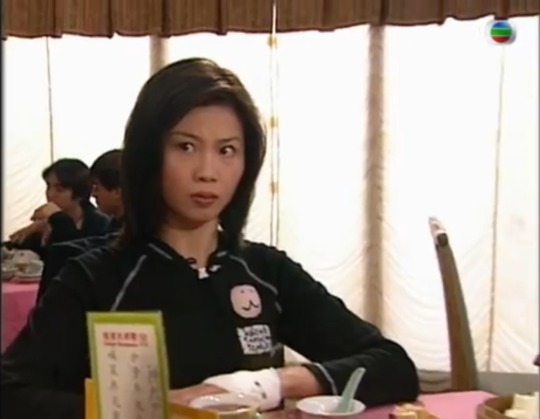
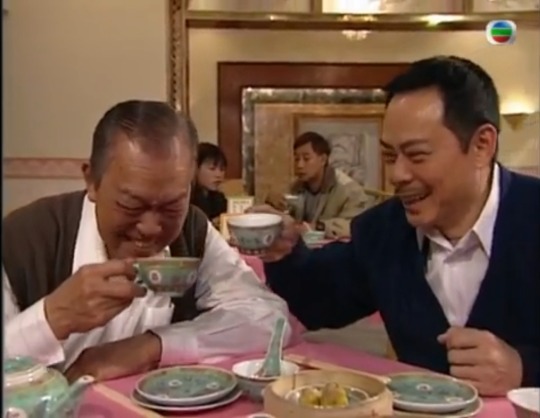
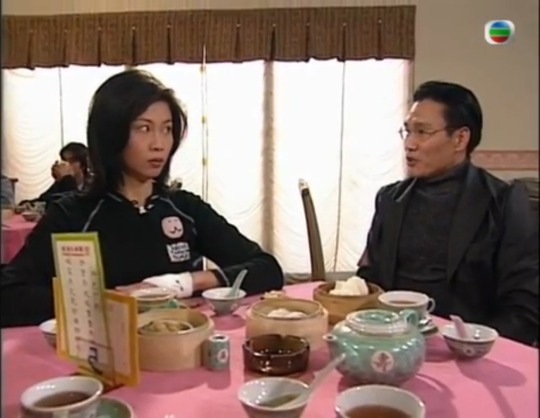
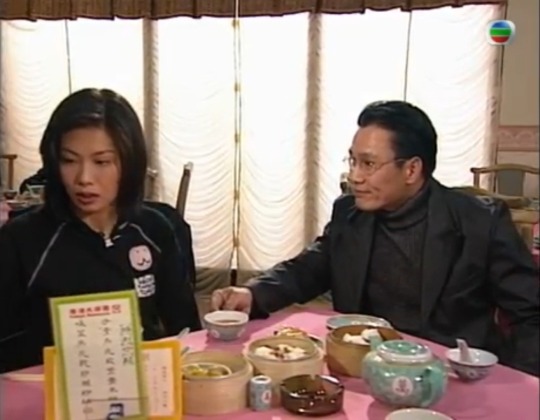
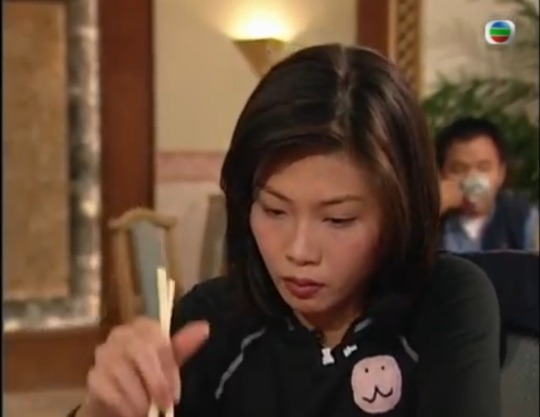
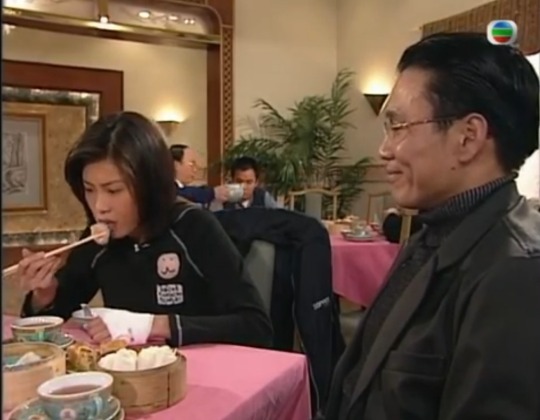
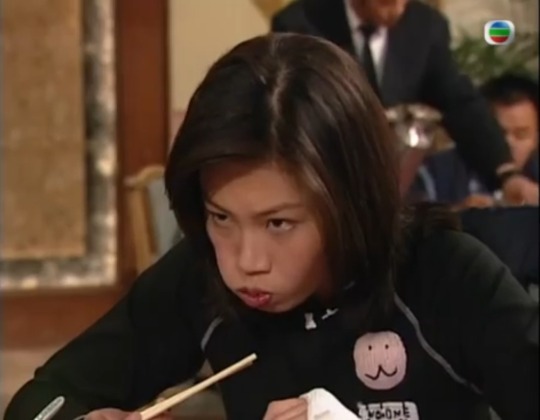
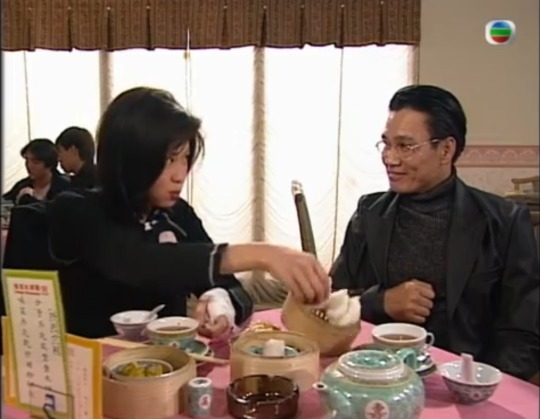
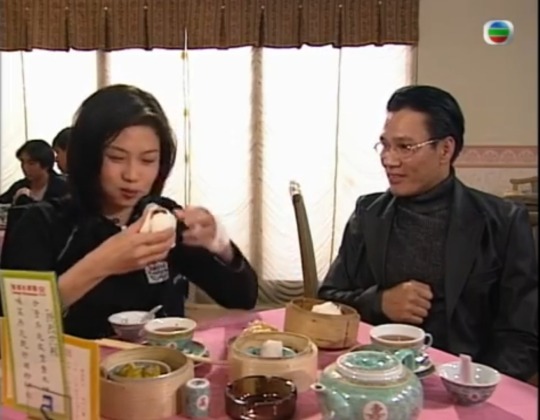
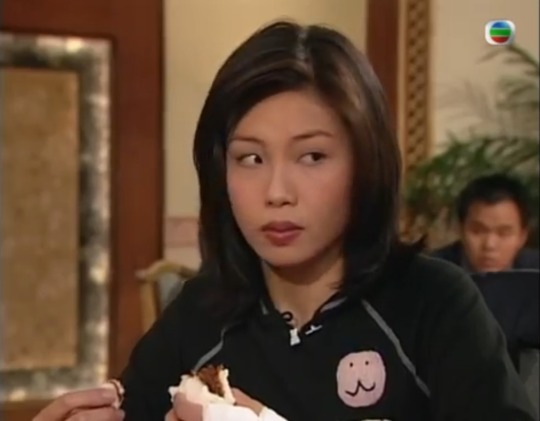
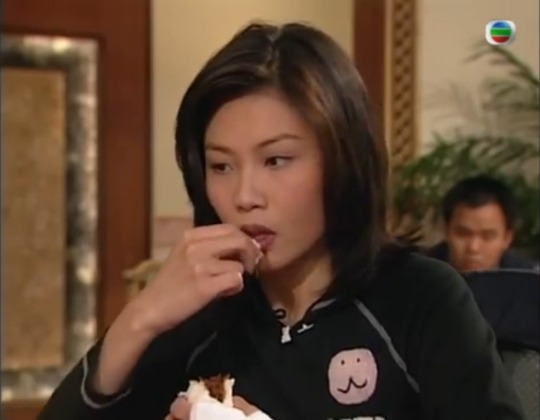
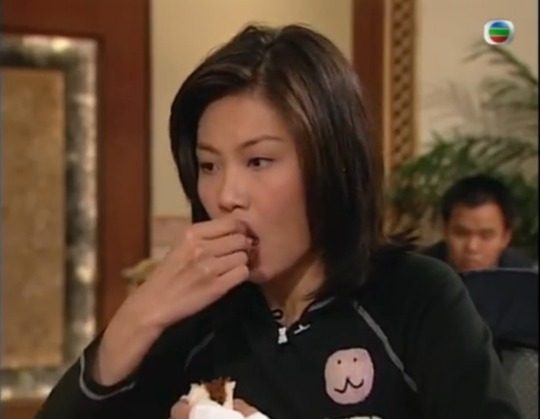
被屋企人呃或者被逼去同一啲無相干嘅人物一齊飲茶…可以理解嘅情況!
To be fooled or forced into having to yum cha with people you don't give a damn about by family…relatable scenario!
《非常保鑣》 (1999) 第五集
#Just recently realised tumblr allows more than 10 images in a post now?#Testing with this post and it appears to work!#Great! Now I may not have to make so many picture collages to accomodate the 10 pic limit in the future!#Since I like this scenario and find it#Relatable#And I like having#Mariane Chan#Posts on my blog…posting again 'cos why not?#HK Drama#Ultra Protection#TVB#Food#Lo Mang#Law Lok Lam#Cantonese#Chinese Language#Language
1 note
·
View note
Text
Daddy Issues, Face, and Filial Piety in Lo and Behold
It is clear from the name of the Hong Kong sitcom franchise Come Home Love (愛·回家), that the central focus is home and family, which are both synonymous in the Chinese character 家. While many Western pieces of media may feature the found family trope — a group of unlikely friends with no blood relation who become a family — Hong Kong’s conservative and traditional Television Broadcast Limited (TVB) company is much more interested in the blood family. The most recent instalment of the sitcom, Come Home Love: Lo and Behold (愛·回家之開心速遞, which literally translates into Love Come Home: Happy Delivery), centres two families that mirror one another — the modest middle-class Hung family and the affluent Lung family. The relationship between Linda Lung (Mandy Lam), one of the main characters, and her father Lung Kam Wai (Law Lok Lam), is a rocky dynamic that heavily revolves around the Chinese traditions of face and filial piety.
The Lung family’s patriarch Lung Kam Wai’s romantic life is loosely based on the real-life Hong Kong-Macau billionaire Stanley Ho, who had four wives. In the sitcom, Lung Kam Wai’s first wife and his alleged greatest love of all time was Ann, Linda and Terry’s mother, who passed away from an illness when the children were young. Next is Melody, who gave him a son Max, the second-most competent Lung child after Linda. Then the third wife is Cindy who was once his nurse, and together they have one son Joe, and one daughter Vivian. Lastly there is the fourth woman who was not allowed to have an official chamber title, and his estranged son King Fung. Undoubtedly, each of these children have their own tumultuous relationship with Kam Wai, as he was not a good father to any of them. For example, Terry wants to be an actor although it is against his wishes, Max is a mommy’s boy who always wants his attention, and King Fung is the bastard child who was estranged from him. As Terry said, he would rather spend Children’s Day with his girlfriends than his own son.
Linda’s problems stem from the “Eldest Daughter Syndrome”, in which she’s forced to grow up too quickly, feels burdened to take care of her younger siblings, and experiences a fair share of the intergenerational trauma. With her mother gone from a young age, Linda only had her father as a parent which caused her to value his validation. The show has only given a small glimpse into Kam Wai’s upbringing and his relationship with his own father, but it is suggested that he is largely influenced by his parenting style. For example, an episode tackles Kam Wai’s struggle with allowing himself to cry because his father gave him the classic “boys do not cry” talk. One of Lung Kam Wai’s characteristics is his traditional, conservative, misogynistic views on his children; he does not see men and women as equal, and favours his sons over his daughters (重男輕女 in Chinese). Out of all the Lung children, Linda is the most similar to Kam Wai and the most capable in terms of intellect, business strategy, and leadership. Of course, since they are a wealthy family, questions about who will inherit the Zip Lung company are bound to be at the forefront of everyone’s minds (Hello, HBO Succession). The fight for inheritance is between the First Chamber, Second Chamber, and Third Chamber, but because Linda is a daughter, all the characters have accepted that there is a next to zero chance that he would give her the company, even though she is the most qualified candidate. Despite that, she continues to work extra hard to bring more profits for the company, and to prove her worth. Linda’s biggest competitor is her younger brother Max, from the Second Chamber. Besides them, none of the other children are particularly interested in taking over the company. Although Max is not as skilled as Linda in the business, their father still gives him plenty of opportunities, and even took the CEO title from Linda. Linda has expressed her envy of Max numerous times, starting from a very young age. In a flashback, Kam Wai chooses to go on a school trip with Max instead of camping with Linda, which prompts a young Linda to say “If only I wasn’t a daughter”. It is an intriguing look into how she navigates femininity and womanhood as well, since she grew up being led to believe that being a girl and a woman is her downfall. How much of this affected the way she grew into a bold, brash, overbearing woman who is often criticized for her “unladylike” behaviour? Her father is the most important person in her life because he is the only parent and role model that she had growing up, and being a daughter is so ingrained into her identity. Whenever Linda attempts to go against her father’s words, he would threaten her with “do you want to be I, Lung Kam Wai’s daughter or not?” and that is enough to silence her each time. It is also her excuse for everything that could harm her reputation or the family name — “After all, I am Lung Kam Wai’s daughter”. It seems that not just being a daughter, but being Lung Kam Wai’s daughter specifically, is her identity, and one that burdens her throughout her entire life.
Besides the question of inheritance, the second largest issue in Linda and her father’s relationship concerns her love interests. Ironically, for a character written as a “strong independent businesswoman”, her relationships with her father and her male love interests are always looming over her. Lung Kam Wai is extremely strict about who his daughter is permitted to date, and if he did not approve of them then he would take drastic measures to ensure that they break up. One of the earliest examples is with Linda’s first boyfriend from university, when he froze her financially and threatened to ruin his chances at graduation. Too young to rebel, Linda chose heartbreak instead, using the excuse “I am Lung Kam Wai’s daughter”. Since they are a wealthy business-focused family, Kam Wai set up his eldest daughter in an arranged marriage of convenience, which ended in a quick divorce after discovering that the groom had fertility issues. It is not the last arranged marriage that Linda is faced with, and eventually she has had enough of it. When she falls in love with Sung Shui Fai — a middle-classed escort-turned-Zip Lung-employee, she finally finds the courage to go against her father for the first time in her life and leaves the Lung family, cutting ties with her father.
Of course, as a family-centric sitcom, Linda eventually finds her way back into the Lung family after a wild string of events. When Lung Kam Wai’s liver fails and is desperately in need of a transplant, none of the children are willing to step up — except Linda, the disowned daughter. She secretly donates one of her livers to him, under the guise that it was actually Terry. Even while she was away from the family, she still cared deeply about her father. There is a scene in which Linda disguises herself as a hospital care worker and helps her father clip his ingrown toenails — a trait which they both share, and a task that none of the other family members are willing to do. Even though Kam Wai discovers that it is Linda in disguise, he does not expose her because he enjoys her company although he cannot admit it. That is the case, until his wives appear and reveal her identity, and even accuse her of gaining his sentiments so that she is included in the will. When her father asks her if that is true, she is extremely hurt by the accusations, not from the others, but from her father; she states that she does not care how the others think of her, but if even he sees her that way (in her words, he “gave her a death sentence”) then she has nothing else to say. Later on, he admits to caring about her too, especially after the truth surfaces and he discovers that it is her liver. His excuse is that as people grow older, face becomes more important, so although he wanted to ask her to return, he could not. Face, a primarily Chinese concept that does not quite exist in other cultures, is a large element of many relationships. It is a sociological idea of something that can be easily taken away, and very difficult to gain. Since everybody must save face, these already stubborn characters are extra adamant on not admitting how they truly feel about one another, and would never request anything until it is too late. This is not an issue that only exists in the fictional Lung family, but surely in many Chinese or East Asian families, and perhaps other cultures too. How many times have you heard about the “relatable” notion of an East Asian parent that never says “I love you” or “I’m proud of you” but shows love in other ways? That’s saving face too. It is worth noting that there are several scenes where Lung Kam Wai admits to his younger brother Lung Kam Kai about his true feelings; whenever he cares about Linda but cannot show it due to face, he tells him in their late night talks. Maybe it has to do with the fact that Kai is of a relatively similar status of seniority in their family, so Kam Wai feels that he can speak to him about these matters without losing face. For instance, there is a milder incident prior to Linda leaving the family, which in hindsight seems to be testing the waters or foreshadowing larger waves in their relationship. In that episode, Linda angers her father by going against his wishes and steals a $2 billion dollar vase in order to rescue her secretary whom she cares about deeply. As a result, he demotes her to working various entry-level jobs around the company. Once again, Linda works extra hard to prove to him that she is skilled in bringing profit to Zip Lung no matter where he puts her, but he pretends to not care. Eventually, he allows her to resume her CFO duties, but only Kai knows that the vase itself was never the reason why he lashed out at her. He simply could not afford to lose face by not punishing her upon her return, so he gave her all the punishments as a display to the rest of the world that he still has power over her.
Power over his children and instilling fear in them is one of Lung Kam Wai’s major concerns with his parenting style. As I mentioned before, how he parents his children and whatever intergenerational trauma he may impose on them could be influenced from his upbringing, but there is not enough insight into his backstory to supplement it. There is an episode where Lung Kam Wai and Hung Shu Gan of the Hung family compare parenting methods and fathering. Initially, Kam Wai frowns upon the way Shu Gan’s children seemingly take advantage of him and finds him foolish for accommodating them and doing their bidding as asked. He attempts to brag to Shu Gan by showing how obedient his children are at dinner, such as arriving early and doing everything he asks. However, Shu Gan quickly discovers that his children only act this way either because they are vying for the company’s inheritance, or they are afraid of him. When Shu Gan’s daughter Mary and Linda are both in a car crash together, he notice something at the hospital — Linda is adamant on hiding the accident from her father, because she is afraid that he would look down on her for being a useless daughter who could not even do something as simple as driving. This clearly shows her living under the shadow of her gender again, and the unhealthy power her father has over her. Shu Gan does not tell Kam Wai about the incident, but he and the audience both know the truth, and can see how Kam Wai’s parenting style is flawed.
Linda and her father’s story is not as linear as one would expect, but instead it seems to go around in circles. Shortly after Linda returns to Zip Lung and becomes CFO again, the company is taken over by Max’s father in law and Lung Kam Wai’s business rival Lui Gong. Kam Wai’s sexist sentiment is so notorious that even Lui Gong uses this against Linda in attempts to manipulate her into working for him instead. He reminds her that even though she is the most capable, he would never give her the company and she would have to watch one of her brothers take control instead. Lui Gong promises to give Linda everything she has always deserved, because he sees the potential in her. Even though Linda seemingly betrays her father by staying with Lui Gong when he takes over Zip Lung, her heart is still with Kam Wai. Here, Linda shows where her loyalties and priorities lie. She does not care if the entire world, including Terry, and Kam Wai, see her as a traitor and a despicable person, because she is considering the long game. She stays with Mr. Lui as a mole, as she rationalizes that it would be much more difficult to take back Zip Lung if she leaves. To further gain Lui Gong’s trust, she devises a plan involving a fake antique to swindle millions of dollars from her father, and spews all sorts of cruel words to his face. For instance, she lies that the only reason why she donated the liver in the first place was to gain her spot back in the company. This is a turning point because the liver donation is a crucial point in their relationship, and is repeatedly brought up as an example of how much she loves him. However, it is not all lies; she reminds her father about the time he set up a trap to scam her and Sung Shui Fai by making them purchase an infected winery, and states this is simply revenge for how distraught she was during those times. She also reminds him of other truths, such as his misogyny and how he regulated her love life, in which he responds by essentially telling her that they never should’ve birthed her. Linda may have been merely acting, but how much of it was her finally saying her true sentiments that she felt trapped in? Yet, afterwards she is shown crying in the arms of Fai (in a stellar performance by Mandy Lam), telling him about what she did and how much she hates herself because of it. So, at that point it seems as though they were back to square one after all that effort to mend their broken relationship before.
As I said before, this family-centric sitcom with the word Happy in the title was eventually going to patch things up. After Lung Kam Wai nearly overdoses in some poisonous alcohol supplied by a suicidal old man, he apologizes to each of his children in a VoiceOver before passing out; to Linda, he admits that he has not been a good father, and says “Thank you, and sorry”. Later in the hospital when he wakes up, he tries to verbally apologize to Linda, but she stops him before he says it, and tells him that she understands in her heart. The lack of apologies from East Asian parents is a recurring theme in the topic of intergenerational trauma, so this scene stuck out to me. Linda could have let him say it, and it could have been a step towards the healing process. Instead, she wanted him to continue saving face, and didn’t want him to have to say it out loud. At the same time, she understands that he is sorry, and that he loves her, but he just has to express it in his own way.
After the truths come out and all is well again, Linda and her father’s relationship is relatively steady . However, yet another arranged marriage arises, this time in the form of an elderly man who quite literally died and came back to life after hearing Linda singing on television. When the company’s finances are in shambles, the only way out is for Linda to marry Old Mr. Yau. Although Kam Wai does not directly force her into it this time, it is still clear that it is the only path, and she conducts it behind Sung Shui Fai’s back. This is where the next major conflict erupts, and when Fai finds out about the marriage, he is inconsolable and upset, not at Linda, but at Lung Kam Wai. This leads to the “dark Fai” arc, in which he turns “evil” and sets up a series of low-grade pranks such as putting a rock in Kam Wai’s soup, or placing a push pin on his chair. From here, it becomes increasingly evident that Linda will always have to choose between the two most important men in her life — her father, or her significant other? (As if a woman either belongs to her father or her husband, how 19th century is this?). Linda discovers that Fai is the culprit that has been harming her father all along, but Fai rationalizes that whenever an issue arises, her father is the first to betray her and throw her under the bus, such as the wedding with Mr. Yau although he promised no more arranged marriages. Fai is not wrong, but Linda later begs him not to harm her father anymore, no matter how Kam Wai treats her in the future, because he is her most respected person. Linda’s word choice here stands out here. When she says her father is her most respected person, she does not say 尊重 for respect, but instead she says 尊敬 — a specific form of respect solely reserved for elders. Respect for elders in Chinese culture is extremely important, as is filial piety 孝 which I will revisit later. This form of honour and respect is the reason why she loves and values her father so much despite how he treats her.
Linda’s respect for her father is also the reason why she waits for his approval to marry Sung Shui Fai rather than eloping with him while she ran away from the Lung family. She had many opportunities to marry him, but instead she wanted to wait until he was ready to accept them, something that Fai had to work hard towards too. After their marriage, an episode shows Linda attempting to take her husband’s surname, stripping her from the lifelong identity of just being Lung Kam Wai’s daughter (because she pitied her husband and he was mocked for being the “malewife” of the relationship, but how progressive is that really when her identity is just transferred over to being her husband’s property? Again, it’s medieval.) Another episode features a jealous Kam Wai as Linda seemingly favours her husband over her father. He turns it into a one-sided battle for affection, so he showers Linda with gifts and favours to win her over (It’s a bit Oedipus Complex-aligned where the father is fighting over the son-in-law for the daughter’s affection). However, after being persuaded by his friend Hung Shu Gan who is in a similar situation, he learns to let go and wishes for her happiness instead.
Filial piety, a value that dates back to Confucius times, is at the core of not just Linda and her father’s relationship, but nearly every Chinese parent-child relationship. It is not only about loving one’s parents, but also about obedience, unconditional devotion, and caring. It is a responsibility that every child must uphold, and perhaps feels guilty for not following. While love between children and parents is prominent across cultures, it is difficult for outsiders of Chinese culture to truly understand filial piety. This depiction of the father-daughter relationship would not work as well had they been white American characters, because this vital element would be missing. It may be easier for Western audiences to see a relationship like this and think, Well clearly he’s an abusive parent, she should leave home forever and never forgive him. It is more complicated from a Chinese perspective, and despite everything Linda has been through, she is still portrayed as an extremely pious 孝顺daughter. She genuinely cares for him and his interests, is often the first to check on him when he is in the hospital, and defends the company because she knows how much Zip Lung means to her father and how he spent his entire life building it up. She also shows how much she values his praise and validation through the way her eyes light up when he compliments her, the way she is quick to wrap her arm around his everywhere they go, and the way she gushes 爸爸 baa4baa1 in a gentle voice.
With over 1500+ current episodes and counting, Linda and her father’s relationship have sure come a long way, although sometimes it seems to regress or run around in circles. As she navigates different chapters in her life, she gradually finds her own identity, separate from her father. She speaks for the daughters in the audience who might have a complicated relationship with their fathers; while they may not be as wealthy as the Lungs, there is still something for everyone to resonate with. Perhaps it is this layer of vulnerability and extra humanity to her usual cold, callous character that makes her a fan favourite.
0 notes
Photo










As Mui celebrates the wedding of her ancestors in the past, scholar Seun attends a different kind of party. The pirates at first are glad to see their old friend but he tells them about giving up piracy to join the Qing navy. The pirates do not like the idea of joining their long time enemies. But one last piece of news calms Potsai, Mui is alive and well, she had also been a prisoner of prince Man Ho.
#captain of destiny#hung tony#chan grace#time traveler#pirates#chan joel#kung cilla#陳展鵬#shiu maggie#dai sunny#chiang ram#law lok lam#洪永城
3 notes
·
View notes
Photo
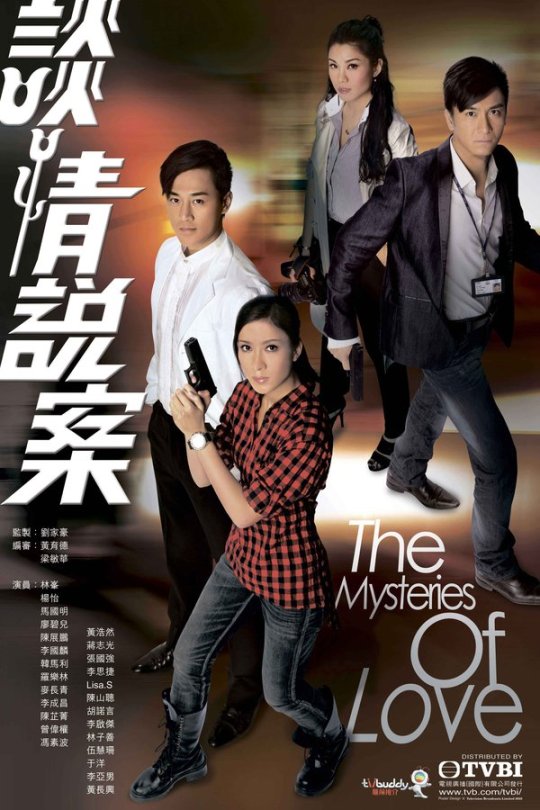
Title: The Mysteries of Love
Episodes: 24
Year/Genre: 2010; Mystery and Romance
Synopsis:
This is a love story between a professor and a policewoman. Their dating experience is enhanced with sense and sensibility through the application of interesting physics theories on the investigation of various crime cases.
KING POK (Raymond Lam) is regarded as the youngest genius in physics and he is appointed as an associate professor in a Hong Kong university. Invited by his good friend LO TIN-HANG (Kenneth Ma), Senior Inspector of Police at Regional Crime Unit, POK assists in cracking many mysterious crime cases and he also meets the policewoman CHUI SIU-LAI (Tavia Yeung) during the process. The rational POK evaluates that he has fallen in love with LAI because of a love hormone called “phenylalanine”. However, owing to the huge difference in their family background and life value, POK fails to tackle their ever-changing relationship problems with formulas.
On the other hand, the romantic and uninhibited HANG has been maintaining a sex only relationship with the journalist LING MAN-KA (Bernice Liu) HANG doesn't believe in eternity and he is only looking for sensual pleasure in a woman. However, his belief is suddenly shattered when he learns that MAN is going to get married.
Cast:
King Family
Raymond Lam as King Pok/Professor King 景博 (Kingsley)
Lee Kwok Lun as King Yin (Philip)
Mary Hon as Chueng Wai-Chu (Victoria)
Candy Chiu as King Chi (Anastasia)
Yu Tze Ming as King Chuk (Uncle George)
Ram Tseung as King Ancestor (Episode 1)
Chui Family
Tavia Yeung as Chui Siu-Lai
Law Lok Lam as Chui Hon-Fei
Fung So Bor as Leung Sau-Ngo
Evergreen Mak as Chui Kwok-On
Lawrence Ng as Chui Ka-Hei
Alex Lam as Chui Kwok-Leung
Ng Wai Shan as Tai Choi-Sheung
Cheung Kwok Keung as Chui Ancestor (Episode 1)
Police Department
Kenneth Ma as Lo Tin-Hang (Gordon)
Jack Wu as Chim Chi-Ko
Lee Kai Kit as Fung Hok-Ban
Lee Sing Cheung as Man PC/Pak-Chu
Astrid Chan as Madam Koo
Rachel Kan
Mandy Lam as Mary
Casper Chan as Wendy
Yeung Ying Wai as Tsik Sir
Rating/Comment: 9/10
1 note
·
View note
Text
Coronavirus death toll now higher than SARS in mainland China - live updates
See on Scoop.it - COMPARE RISK COMMUNICATION
LIVE UPDATES More people have died from Wuhan coronavirus than SARS in mainland China By Joshua Berlinger, Brett McKeehan and Adam Renton, CNN Updated 7:25 a.m. ET, February 3, 2020 Share 46 Posts SORT BY Vietnam has confirmed an additional case of the Wuhan coronavirus in the province of Vinh Phuc, bringing the total number of confirmed cases in the country to eight. According to state broadcaster VTV, the latest case involves a Vietnamese national who returned home from Wuhan on January 17. The patient then had her samples taken for testing by the Ministry of Health on January 31, and officials confirmed that she had tested positive for the coronavirus on Monday. Here's where else the virus has spread: Two groups of Mexican students studying in China have returned home without symptoms of the Wuhan coronavirus, according to statements from the state of Guanajuato. The groups consisted of 18 people who returned Saturday and 11 people who landed Sunday. In total there were 52 Guanajuato students studying in various Chinese cities -- all are expected to return by February 5, one statement said. In compliance with World Health Organization protocols, health authorities will contact the students for the next two weeks to monitor any symptoms. The UK Government has pledged £20 million ($26 million) to develop new vaccines for coronavirus and other infectious diseases, the UK Department of Health and Social Care announced Monday. It will help our globally recognised vaccine development capabilities continue to develop new defences against emerging diseases including coronavirus,” UK Health Secretary Matt Hancock said in a statement. The new funding will go to the Coalition for Epidemic Preparedness Innovations (CEPI), which was originally formed in response to the Ebola epidemic in West Africa. It will help with three new programs to develop vaccines against the novel coronavirus, 2019-nCoV, the statement said. Dr Richard Hatchett, CEO of CEPI said he hoped that an investigational vaccine could be through to clinical testing in 16 weeks The rapid global spread and unique epidemiological characteristics of the virus are deeply concerning,” said Dr. Richard Hatchett, CEO of CEPI, who added: “Our hope is that, with our partners, we can get an investigational vaccine from gene sequencing of the pathogen through to clinical testing in 16 weeks. The earliest stage of clinical trials (Phase I), to establish the safety of investigational vaccines, would take around two to four months.” Russia may deport foreign nationals if they have coronavirus, Prime Minister Mikhail Mishustin announced Monday, according to Russian state news agency TASS. TASS cites a federal law stating that a foreigner can be deported if their presence poses a real threat to public health. Mishustin said that a national plan to prevent the spread of the coronavirus infection in Russia has been signed, and the virus has been added to the list of highly dangerous diseases. It will allow us to deport foreigners if they are diagnosed with this disease and introduce special restrictions, including isolation and quarantine," the Russian prime minister said. There are two confirmed cases of coronavirus in Russia, and the country has already closed its entire Far East land border to prevent the spread of the disease. TASS reported that the movement of Chinese nationals through Russian territory has been restricted, and that those diagnosed with the disease have been isolated and are receiving the necessary treatment. Mishustin added that Russia has stopped issuing work and group tourist visas to Chinese nationals for the time being. The Chinese government on Monday declined to comment on the delay of the second US evacuation flight to the epicenter of the coronavirus outbreak, after slamming Washington’s response to the epidemic as an overreaction that fanned global hysteria. When asked by CNN if the delay of the charter’s arrival in Wuhan is related to Beijing’s displeasure over the US response, Chinese Foreign Ministry spokeswoman Hua Chunying said: “The US was the first to evacuate its consulate staff in Wuhan via charter flight. Relevant arrangements must be coordinated based on a variety of factors including Wuhan airport capacity to receive supplies.” Hua confirmed that China has said it welcomes the US to join the World Health Organization (WHO) expert team on the outbreak and the US has submitted a list of names to the WHO. In a globalized world, the destinies of all countries are closely linked. In the face of a public health crisis, countries should work together to overcome the difficulties, rather than resort to beggar-thy-neighbor practice, let alone take advantage of others' difficulties,” she said at a press briefing Monday. Last Wednesday a chartered plane carrying some 200 US citizens -- including about three dozen diplomats and their families -- arrived at March Air Reserve Base in Southern California. A flight carrying 56 Italian nationals from Wuhan, China, landed at Pratica di Mare military airport, outside of Rome, on Monday morning. The passengers will undergo medical examinations at the airport before being transported to a military compound on the outskirts of Italy's capital. The people are scheduled to remain in isolation at the facility for 14 days. As of now, no one in the group has shown any symptoms of coronavirus, Health Ministry spokesman Nicola del Duce told CNN. Hong Kong leader Carrie Lam on Monday announced new border closures over the Wuhan virus, amid intense public pressure to stop anyone crossing into the city from mainland China. Lam said further measures were being taken "to ensure the control of the boundary control points to reduce people movement across the border," but fell short of a complete sealing off of the city. Lam said the main land borders at Lo Wu and Lok Ma Chau would shut as of midnight tonight, as would the Hong Kong-Macau Ferry Terminal. That will leave all but three border crossings between Hong Kong and mainland China closed. Those which remain open are the city's international airport, the Shenzhen Bay border and the Hong Kong-Zhuhai-Macau bridge. Lam's announcement comes after health workers in Hong Kong began a five-day strike on Monday, demanding a full border closure and greater support from the government. "This has nothing to do with the five-day strike by healthcare workers," Lam said, however. "If anyone thinks that by resorting to such extreme measures the government will be made to do something that is not rational or something that will only harm the public they will not get anywhere." The number of Chinese citizens entering Hong Kong has fallen since the initial closures, the government said earlier, with the vast majority of those continuing to cross the mainland border being Hong Kong residents. It is unclear how the new closures will affect those who work in the city but live across the border, and vice versa. The G7 nations will hold a joint telephone conference to discuss how to deal with the coronavirus outbreak, German Health Minister Jens Spahn announced after talking with his American counterpart Alex Azar on Sunday. A call will take place at 9 a.m ET on Monday, according to a spokesperson for the Italian Health Ministry. The G7, a group of seven leading industrialized democracies, includes Canada, France, Germany, Italy, Japan, the United Kingdom and the United States. Months of increasingly violent protests and a bruising US-China trade war pushed Hong Kong into a recession last year for the first time in a decade. Now the coronavirus outbreak threatens to derail things once again. Officials on Monday said Hong Kong's economy shrank 1.2% last year as massive pro-democracy protests paralyzed the city's streets and scared away tourists. GDP shrank 2.9% in the fourth quarter alone. The trade spat between Washington and Beijing compounded the problem, as did concerns about China's economic growth. Until recently, the Asian financial hub had reason to hope that 2020 would be better. The demonstrations were becoming less frequent, while an initial trade deal provided some hope that the relationship between the United States and China could improve. "The US-China phase one trade deal and growth stabilization in China should have been positive for Hong Kong's near-term economic outlook," said Tommy Wu, a senior economist at Oxford Economics. "But it has been overshadowed by the coronavirus outbreak." Read more here
0 notes
Link
January 19, 2020 at 09:45AM
(HONG KONG) — Clashes broke out between protesters and police in Hong Kong on Sunday, cutting short a rally after thousands had gathered at a park to call for electoral reforms and a boycott of the Chinese Communist Party.
Police fired tear gas near the park, known as Chater Garden, after some protesters attacked men whom they believed to be plainclothes officers, in a return to the violence that has roiled the Chinese territory off and on for months.
Sporting their movement’s trademark black clothing and face masks, rally participants had earlier packed into Chater Garden, located near the city’s Legislative Council building. They held up signs that read “Free Hong Kong” and waved American and British flags.
“We want real universal suffrage,” the protesters chanted. “Disband the police force, free Hong Kong!”
Ventus Lau, the rally’s organizer, was arrested in the evening for allegedly breaching the authorities’ conditions for the rally and repeatedly obstructing officers, police officer Ng Lok-chun told reporters at a news briefing.
Earlier in the day, Lau said he believes more large-scale protests are needed for global attention to return to Hong Kong, with the protest movement losing some of its momentum in recent weeks.
“I think Hong Kong has not been the focus of the world anymore,” he said, urging other countries to launch sanctions against Hong Kong’s government if it does not allow residents to directly elect Legislative Council members this year.
A former British colony, Hong Kong was returned to China in 1997. While the framework of “one country, two systems” promises the city greater democratic rights than are afforded to the mainland, protesters say their freedoms have been steadily eroding under Chinese President Xi Jinping.
Frictions between democracy-minded Hong Kongers and the Communist Party-ruled central government in Beijing came to a head last June, when proposed extradition legislation sparked months of mass demonstrations.
The bill — which would have allowed Hong Kong residents to be sent to mainland China to stand trial — has been withdrawn, but the protests have continued for more than seven months, centered around demands for voting rights and an independent inquiry into police conduct.
While the protests began peacefully, they increasingly descended into violence after demonstrators became frustrated with the government’s response. They feel that Hong Kong leader Carrie Lam has ignored their demands and used the police to suppress them.
In response to Sunday’s rally, Hong Kong’s government released a statement that warned against any foreign involvement. Beijing has repeatedly accused foreign countries like the U.S. of inciting riots in Hong Kong in a bid to sabotage China’s development.
The statement outlined the “universal suffrage of ‘one person, one vote’ as an ultimate aim” enshrined in the city’s de facto constitution, known as the Basic Law. This step must be implemented in line with “gradual and orderly progress,” the statement said.
Underpinning the protests is a deep distrust for the central government and Xi, who is widely considered China’s most authoritarian leader in decades. Some protesters have accused Lam of being “Beijing’s puppet,” a label she has rejected.
Demonstrators have routinely thrown bricks and gasoline bombs at riot police, who have responded with tear gas, rubber bullets and — on rare occasions — live rounds.
The months of unrest have sent the financial hub’s economy reeling, as shops have shuttered during clashes and tourists have stayed away.
Hong Kong police gave approval for Sunday’s rally, but not for a march that organizers had also planned. The march didn’t happen, and the protest was curtailed by clashes after police ordered an end to the rally hours before the pre-approved finishing time.
Protesters used bricks, umbrellas and traffic barriers to barricade a road. They ran for cover after riot police appeared around Chater Garden and raised yellow warning flags, telling demonstrators that they should disperse because they were participating in an illegal assembly.
Two officers were bleeding from the head after a group of “rioters” attacked them with wooden sticks, police said in a statement, adding that some also lobbed water bottles and other objects at law enforcement. Others threw paint bombs at buildings in the Central business district, according to police.
Several young protesters were handcuffed outside the park, as officers made arrests and conducted searches into the evening. One man who refused to be searched retreated into a public restroom that was promptly surrounded by riot police.
Ng, senior superintendent of police operations in the Hong Kong Island region, told reporters that authorities had no choice but to call an end to the rally in light of the “rampant rioting.” He described the two attacked officers as “community relations officers” who were sent to Chater Garden as a “gesture of goodwill.”
___
Associated Press writer Yanan Wang in Beijing and photographer Ng Han Guan in Hong Kong contributed to this report.
0 notes
Video
instagram
🎉2020鼠年開運小秘密♨️點亮前程🛑 點亮整體運勢🉐點亮一整年的好運☯️ 。鼠年開運必點的🔥#開運吉祥光明燈🔥,由🐲北龍王大師於新年��間30/1/2020,���自誦經祈福代點🎊 🐭鼠年開運吉祥光明燈能開啟八大好運💯,為你迎來八方貴人財氣🎉。流年犯太歲的善信除了化太歲之外,點上光明燈更是不二之選🔆,能祈求眾神庇佑自己身體健康💯,豐衣足食🈵,前途光明☀️,化解危機♨️,擋去災劫⚡,扶持運勢長年大旺🛑,鼠年行大運🎉。 ㊙️師傅用以最強祈福開財補運法陣經文呈現⚛️,誦經三日,還能最大限度助您化解漏財窘境🙏,強化您的財富運勢💰,讓你常保旺財好磁場🔥,正偏財通通不錯過❗ ㊙️誠心點燃開運光明燈♨️,能有效提升自己整体运势💯,開運💯,化太歲💯,防小人💯,防口舌是非💯,擋去災劫💯,遠離疾病纏身💯,招八方貴人💯,扶持事業💯,提升本身磁場💯,破流年受阻之運💯,凡是能得心應手💯,提升各方面的優勢💯,財運亨通💯,防止破財漏財等💯。 名額非常有限🎈趕緊報名❗ 祈福法會人無需出席,只需提交姓名,出生年月日等资料即可。 下圖為舊照,只供參考🙏 ㊗️感恩各位參與報名的善信㊗️ 祝各位恭喜發財💰💰💰萬事如意🀄🀄🀄 1。HOH TONG YU 2。soo chai foong 3。soo chai ping 4。soo chai wen 5。YOU YAU KUANG 6。Steven lim zheng Wei 7。lau mei fong 8。Loh yee siang 9。Sylvia Yenny Pui 10。Yung Kwan Lee 11。Dato Chai Kian Wei 12。Teh Siong Wie 13。LAW SIEW LING 14。HANG WEI HEN 15。Lee Chiew Ying 16。Jason Lok Chan Hong 17。Kong pei wen 18。Jap swee tark 19。khor tit sern 20。Ling Yian Jimpo 21。Chiang Min Nyiet 22。Lai Kian Feng 23。OH LEONG YI 24。OH WAT POH 25。HII HIONG SING 26。Pang Guan Hing 27。peh ann gee 28。Wong Mei Lin 29。Chong Chin Hong 30。Koo Yoon Loi 31。ling liang hong 32。Wong Lam Seng 33。LENA TEO LEE NAH 34。Niee Kor Chung 35。Wong Sien Hong 36。Leong Kum Foong 37。CHEAH CHUI FUN 38。tan ying xian 39。Yuen Sook Mun 40。Yuen Yong Keng 41。 42。 43。 45。 46。 48。 49。 50。 51。 52。 53。 54。 55。 56。 57。 58。 59。 https://www.instagram.com/p/B7ii6DNlVaF/?igshid=10cwouzxiust3
0 notes
Text
Hong Kong’s Universities, the Last Refuge of Protesters, Become Battlegrounds
HONG KONG — Seething with anger, the black-clad students hurled gasoline bombs, threw bricks and even aimed flaming arrows at the riot police, who answered with tear-gas volleys and rubber bullets that hurtled into Hong Kong’s university grounds for the first time.
And with those battles on Monday and Tuesday at the territory’s largest universities, another unspoken rule in the antigovernment protests that have been convulsing Hong Kong for six months was shattered: the sanctity of educational campuses from the police.
The clashes turned what had been sanctuaries for the students at the core of the movement into scenes that evoked medieval citadels under siege.
They opened a new chapter that threatens to further disrupt the Asian financial capital, which has struggled for normalcy despite the increasingly violent protests against the Chinese Communist authorities in Beijing who have the last word over Hong Kong’s future.
Hong Kong has fallen into recession as tourists have fled and as its busy shopping areas become backdrops for street battles between demonstrators and police officers. The world is asking hard questions about what could befall Hong Kong as Beijing further tightens control over a city that is supposed to operate under its own laws.
[Why are people protesting in Hong Kong?]
The most dramatic student-versus-police clash unfolded late Tuesday night at a barricaded bridge leading to the campus of the Chinese University of Hong Kong. For hours, police officers fired hundreds of rounds of tear gas and rubber bullets and students hurled Molotov cocktails and bricks, and practiced firing bows with flaming arrows. More than 100 injured students were brought to a makeshift first-aid clinic in a gym.
By targeting campuses, the police have breached the last refuge of the protesters, a move that brings the violence to the heart of the universities and invokes the pivotal and fraught role of student activism in the global history of democracy movements.
“One thing that people have realized is that the protests, the movement, the conflict, is unavoidable,” Gabriel Fung, a 19-year-old second-year student at the University of Hong Kong, said. “It’s going to reach you wherever you are at some point.”
It is at these universities where young leaders and other students have been organizing revolts against the Chinese Communist Party and spreading the pro-democracy ideas that undergird the protests. And here, too, that the students discuss the wealth inequality and cultural homogenization that have led to visions of a bleak future among many of their generation.
In Hong Kong, university administrators and professors now find themselves in a difficult position, trying to preach tolerance and walk a tightrope of furious demands from students, the police and government officials. Two schools on Wednesday ended their semesters weeks early.
“Not a single place in Hong Kong is exempt from the rule of law, and that includes universities,” John Lee, the secretary for security, said Wednesday at a news conference. “Universities are not supposed to be the breeding ground of violence.”
The showdown has been brewing for years, going back to the pro-democracy Umbrella Movement of 2014. And the roots of the protests in many ways harken back to social movements elsewhere.
On mainland China, students have led campaigns calling for sweeping political change, notably in 1919 and 1989. In the United States in the late 1960s and early 1970s, violence broke out on campuses during anti-Vietnam War protests, most horrifically at Kent State University in 1970, when Ohio National Guard troops opened fire on students, killing four and injuring nine.
Student activists in Hong Kong have lived by an exhausting weekly rhythm since the movement began in early June: protest on weekends, show up on Mondays for class, study for exams and apply for internships or jobs in between it all. Many argue with parents who disagree with their politics or tactics. Hundreds have been arrested in recent months and quickly released by the police, as required by law.
It was the death of a university student this month that set off the current round of protests and violence. Chow Tsz-lok, a student at the Hong Kong University of Science and Technology, sustained a fatal injury after falling from a parking garage near a police action on Nov. 4. Thousands attended candlelit memorial rallies last weekend, and his photograph is on posters and makeshift shrines all over campuses, since he is now a martyr for other students.
Roiled by the latest unrest, universities canceled classes from Monday to Friday. That meant protesters have been able to hit the streets at dawn on weekdays after sleeping a few hours. On campus, activists have sprayed fresh graffiti, including phrases cursing administrators.
The fraught situation led police officers on Wednesday to organize an evacuation of dozens of mainland Chinese students across the border to Shenzhen, where hotels offered them free rooms.
One graduate student at Hong Kong University said he and others from the mainland still felt safer on campuses than on the streets. He said many students do not openly express pro-Beijing opinions and sometimes avoid speaking loudly in Mandarin, the dominant language back home. (He spoke on the condition of anonymity because of the tensions.)
Some university departments have delayed recruitment drives of mainland and foreign students to come up with new strategies; a drop-off in enrollment by mainland graduate students, who often pay full tuition, would lead to budget problems.
Hong Kong’s public universities, which have more than 86,000 undergraduate and nearly 11,000 graduate students, each have distinct characters. That means the students have occupied different roles in the movement, and the protests have played out in different ways on each campus.
The Chinese University of Hong Kong, with 20,000 students, is considered the most radical campus. Most of its students are Cantonese-speaking locals, some of whom live nearby with their parents in dense apartment blocks. And the campus is high in the hills of Sha Tin, isolated from the city center, which is an hour’s ride away by subway.
On Monday, the police arrested five students on the campus’s edge, administrators said. The next morning, the police, still at the border, confronted front line students, and clashes took place over 20 hours. Rocky S. Tuan, the president, who has been known for trying to engage with students during the movement, showed up during a lull in the evening to urge the students to be calm.
“You all should know that I really want to help you. I will do everything within my capability,” he said. “It is the university’s responsibility to maintain peace on campus, not the police.”
But as Mr. Tuan began walking away, the police fired tear gas. Mr. Tuan himself was enveloped in the gas. Students set fires to keep the police from advancing, and scores formed human chains to pass along bricks, umbrellas and bottled water to the front lines. Students sitting on one patch of road made gasoline bombs as if on an assembly line.
“It was a savage move and a type of police violence when they tried to encroach on the university,” said Timothy Chow, 23, an engineering student who graduated in June. “This is why we have to protect our Chinese University of Hong Kong.”
“When I saw our compatriots and Chinese University staff being hurt by the police, I felt particularly furious and wanted to come back to defend our university,” he added.
At the University of Hong Kong this week, front-line students also set up barricades and, against the advice of professors, threw paving bricks off balconies, even though it is considered the most establishment of the territory’s schools.
Founded in 1911, it is the territory’s oldest university. Many of its students are foreigners or Hong Kong residents who attended international schools. English is the main language, and the university aims to open a mainland China campus. Among its alumni are many police commanders and Carrie Lam, the territory’s chief executive who is reviled by protesters.
On Monday, the students were on edge in part because the police had taken a student from a dormitory area early that morning.
Two liberal law professors, Hualing Fu and Johannes Chan, urged a group of front-line protesters in masks not to resort to violence and to understand that the struggle for democracy was a lifetime commitment, according to video footage. But one masked woman shouted they had no choice, and asked: “How many people are we going to sacrifice?”
“We are better, we are different,” Mr. Fu said.
“But we shall not forgive,” a young man shouted, “we shall not forget.”
On Monday and Tuesday mornings, police officers arrived at campus entrances to try to clear the barricades. They fired tear gas, but retreated.
Students have called on the president, Xiang Zhang, to forcefully condemn the police, but he has refrained from doing so, and, unlike Mr. Tuan, rarely holds open forums. On occasion, professors have shown up at the front lines to speak to students, as William Hayward, dean of social sciences, did on Tuesday.
“Obviously, as it goes on and as it gets more polarized, this becomes increasingly a challenge,” Mr. Hayward later said of student engagement. “Some of them do really open up, but at the same time, you know, of course they’re trying to figure out — is he on our side or is he trying to silence us?”
As night fell on Tuesday, students traded shifts at the barricades, walking past a famous eight-meter statue of orange corpses, “The Pillar of Shame,” that memorializes the 1989 massacre of pro-democracy students and workers around Tiananmen Square in Beijing by the Chinese government.
Paul Mozur and Katherine Li contributed reporting.
Sahred From Source link World News
from WordPress http://bit.ly/2CGPWpn
via IFTTT
0 notes